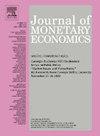关税战、失业和最高收入
IF 4.3
2区 经济学
Q1 BUSINESS, FINANCE
引用次数: 0
摘要
在 2018-19 年全球关税战的激励下,我们建立了一个包含职业选择、异质企业和失业的多国贸易模型。该模型具有完全的关税传递和正向最优关税,可解决产品和劳动力市场扭曲问题。对模型中四个国家/地区的定量分析表明,一国单方面提高关税会增加福利,但也会提高该国的失业率和最高收入,而对关税目标国的影响则相反。全球关税战会降低每个国家的福利、失业率和最高收入不平等,而从全球关税战转向自由贸易则会提高每个国家的福利、失业率和最高收入不平等。本文章由计算机程序翻译,如有差异,请以英文原文为准。
Tariff wars, unemployment, and top incomes
Motivated by the 2018–19 global tariff war, we develop a multi-country trade model with occupational choice, heterogeneous firms, and unemployment. The model features a complete tariff pass-through and positive optimal tariffs addressing product and labor-market distortions. The quantitative analysis of the model with four countries/regions shows that raising tariffs unilaterally by a country increases welfare but also raises unemployment and top incomes in that country, whereas having the opposite impact on tariff-targeted countries. A global tariff war reduces every country’s welfare, unemployment, and top-income inequality, whereas moving from a worldwide tariff war to free trade raises every country’s welfare, unemployment, and top-income inequality.
求助全文
通过发布文献求助,成功后即可免费获取论文全文。
去求助
来源期刊

Journal of Monetary Economics
Multiple-
CiteScore
7.20
自引率
4.90%
发文量
90
审稿时长
74 days
期刊介绍:
The profession has witnessed over the past twenty years a remarkable expansion of research activities bearing on problems in the broader field of monetary economics. The strong interest in monetary analysis has been increasingly matched in recent years by the growing attention to the working and structure of financial institutions. The role of various institutional arrangements, the consequences of specific changes in banking structure and the welfare aspects of structural policies have attracted an increasing interest in the profession. There has also been a growing attention to the operation of credit markets and to various aspects in the behavior of rates of return on assets. The Journal of Monetary Economics provides a specialized forum for the publication of this research.
 求助内容:
求助内容: 应助结果提醒方式:
应助结果提醒方式:


